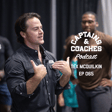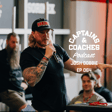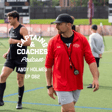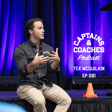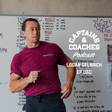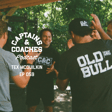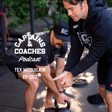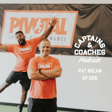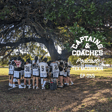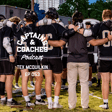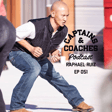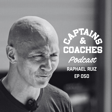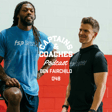Warm-Up and Athlete Needs
00:00:00
Speaker
utilizing that first 15 to 20 minutes of doing soft tissue mobility, warmup, and and those types of things tells you more about like what you're going to be up against or things that maybe you should ask more questions about that.
00:00:14
Speaker
you know If you just do the the casual, like, hey man, like what did you do last night? How was dinner? you know And you waste that opportunity, then you miss out on so much information as a coach that you could be gathering that is going to determine what what you're going to see
Introduction to Leadership in Athletics
00:00:31
Speaker
Welcome to the Captains and Coaches podcast. We explore the art and the science of leadership through the lens of athletics and beyond. I'm Eros Texum Kulkin, and today I travel to Fast Performance in Denver, Colorado. to sit down with Joel Rayther, 17 years as a strength and conditioning coach for the Colorado Mammoth and a leading pioneer for hunting and performance training.
00:00:52
Speaker
Joel has mastered the art of seeing beyond the physical, and you're about to get a masterclass on Joel's process-oriented approach to using failure as fuel for growth, why authentic relationships trump perfect programming, and his empowering philosophy that excellence isn't about being perfect. It's about bringing your best to this world.
00:01:13
Speaker
moment. We'll explore how creating perspective transforms obstacles into opportunities for athletes and why the most impactful coaches focus on developing the complete human.
Failure and Authentic Relationships in Coaching
00:01:23
Speaker
With that, let's hand it off to Joel to help us raise the game. Ready, ready, and pray.
00:01:29
Speaker
It's rare that I do a podcast in my studio for someone else. yeah So this is ah this is a treat. I didn't have to do anything but just come in, sit down, and I say look good, but, I mean, this is as good as it's going to get. Just be you. Yeah.
00:01:44
Speaker
I'm going to lead off with a ah fun question here okay because you've been with the mammoth for how long uh just finished year 17 year 17 yeah and then the nhl utah hockey team is just renamed oh geez we're going there right away their squad yes and you know how many people have already reached out to me about yeah because the mammoth's twitter account it started chirping utah and being like hey hello Yeah, because even the hashtag was I saw that on ESPN last night and I'm like, you got to be kidding me, which is tusks.
00:02:19
Speaker
Well, they said tusks, plural tusks up. But that that actually started from one of our players in a postgame. He was the one that actually would like, they did a post-game interview after we had won a game, Connor Robinson.
00:02:36
Speaker
And, um you know, they do all the rigmarole, you know, oh, what do you think tonight? This and that, whatever. And um it's on field, you know, and everyone's excited. And he says, dusk up, baby.
00:02:48
Speaker
and it just stuck. And so now fast forward to this conversation and you're kind of like, oh my gosh. So, but I don't know. I told people, I said, Maybe it'll be good for us. Maybe a lot of people will find out about, you know, the Colorado mammoth that they'll accidentally stumble on us, that there's another mammoth out there that,
00:03:06
Speaker
Existed long before.
Lacrosse Physicality and Canadian Influence
00:03:07
Speaker
yeah Like the actual Mammoth, then the newest Mammoth on the block. so Yeah. Yeah. in Indoor lacrosse is something special. So as a a field player myself, and we got the opportunity in summer, just stick stick us in some form of roller rink.
00:03:23
Speaker
Yeah. ah just Just to get the team together. But as a defensive middie, that was my dream. Yeah. just now these hits are legal. yeah Oh, yeah. hundred percent. Yeah. Yeah. And I, that's, I think that's the, the fun and the excitement with indoor, um, is it takes everything and closes it into that, you know confined space.
00:03:46
Speaker
And at the end of the day, it's just, there's a lot more physicality. Yeah. There's a lot more contact. Uh, and, and I find that As much as it's still lacrosse and lacrosse is lacrosse, they're just so different, right? It's so different compared to to the field game.
00:04:05
Speaker
I mean, smaller windows and then the the physicality. and I've coached Canadian dudes at the college level, and it's it's like the weight room doesn't make sense between their their speed, their shot, and then seeing them not bench press 185 pounds, but just be this toughest yeah like dude out there.
Path to Strength Coaching
00:04:28
Speaker
it's It's such an anomaly, and I've had this conversation so many times with guys where we've tried to wrap our head around what are the, the key performance indicators, right? Like what are those for lacrosse?
00:04:43
Speaker
And, In all the years that I've worked with lacrosse players and previous to yeah few iterations of places that I've been, i spent seven seven or eight years at the Division I level, worked at the University of Denver. So my first iteration with lacrosse was field.
00:05:01
Speaker
And we just so happened to be recruiting a lot of Canadian players at that time. Jamie Monroe was the head coach. and And so that was kind of like this slow burn of how I ended up with the Mammoth was a lot of those players were playing in indoor Canadian in the summer.
00:05:19
Speaker
And then some of them started playing in the NLL and PL or MLS MLL s or ml l at that time. And it was just one of those things where watching the Canadian players come and play field and blaringly seeing the difference right away where it was like, they were like a kid in the candy store because they grown up, grown up where, yeah, if you caught the ball in the middle of the field, you were just going to get crushed.
00:05:44
Speaker
And now they're like, look at all this space and this bigger net. They're like, this is great. You know, i remember we had a freshman scored like 50 goals one year. So, um, so it's interesting for sure. And I mean, your, your performance experience didn't start with lacrosse.
00:06:01
Speaker
In college baseball player, like was performance part of your college training routine or was it just play ball? No, a hundred percent. I grew up in Nebraska. And so, you know, Husker power was, you know, yeah um prevalent at that time and the big red machine and all that. So.
00:06:18
Speaker
every high school in Nebraska was like, we should, we should all be doing this. Right. And so we did some former fashion of, of a strength and strength program. I wouldn't say conditioning when there was no, that was never in Nebraska. and no No, no, never, never part of that. But, uh, I was fortunate enough that we had a a weight room class in high school. So three or four, however many days a week we would lift. And then we had summer weight room hours. And so When I got to college, it was one of those things where it was a not quite as structured, but we had strength conditioning coaches. And that was realistically where i you know kind of went like, this is what you do for a living. and so the two between being a college athlete and where I am today, like that that room is where kind of like everything came together. Because I think
Early Leadership and Mentorship
00:07:13
Speaker
part of me also had...
00:07:14
Speaker
some realization that, you know, maybe I was not going to be a professional athlete, you know, as much as all of us probably wish and desire for those things. It was something where I saw that I was always pretty proficient in the weight room because I i got introduced to it when I was a freshman high school and I kept seeing things improve and and saw some success. And then I got to college and that continued a little bit.
00:07:41
Speaker
And then I realized that There's a guy in this room that this is what he does for a living. And so somewhere something clicked with me and that was like, I, if I can't be an athlete, then it would be great if I could find a way to be around athletics, um, just with my competitive nature and always kind of wanted to be in and around it. And here we are 25 later.
00:08:03
Speaker
Yeah. so Man. Wow. And what was that first, uh, like leadership coaching opportunity? Um, first leadership from, for me was, ah Mike Sanders, who you might know, Mike was, was one of my mentors, John Larson, who not many people know.
00:08:20
Speaker
John is a phenomenal coach. Those were my two mentors kind of coming up and they kind of The program there in the exercise science department, which is a phenomenal exercise science department at the university Nebraska Kearney, uh, had slowly built to where there was a graduate, graduate assistantship jobs there.
00:08:42
Speaker
And i was fortunate enough that i didn't really want to be in the traditional role because they were focusing on childhood obesity. And I was like, that's not, not my thing. I get it. Uh, but Mike had left and went to university of Denver and So when he left a graduate assistantship kind of assistant strength condition role became open.
00:09:06
Speaker
And so John, i was fortunate enough, john granted me that job and he just threw me out into the wild and let me make a lot of mistakes and gave me a lot of rope where he kind of, you know, stood at arm's length, guided and kind of, you know, pushed me in the right directions and made sure that it wasn't killing anybody in
Professional Development in Coaching
00:09:28
Speaker
And that's, that's where it started. And I got really some ownership of three or four teams when I was in grad school and it just kind of progressed from there. so And that that responsibility is huge because all of a sudden these these kids' livelihoods are in your hand, that responsibility of that first year. Did you feel that pressure? Did you feel that weight at that time?
00:09:53
Speaker
i I don't think I was able to really digest or internalize it at that point. I think for me it was... a mixture of everything being like a fire hose and at the same time being young and energetic and and excited, and you know, just even to have that opportunity.
00:10:12
Speaker
And so Looking back, I mean, it i don't think there was a part of me that was able to really think that at that level yet.
00:10:23
Speaker
so I don't think I had that level of maturity, to be honest with you Was there a moment, an injury, or ah ah like a mistake if coach came down and knew like, hey, you were unaware here? And was there any like moment decision that led to a consequence that made it real?
00:10:42
Speaker
Um, to be honest, too I think one of the first points where I kind of like stood back and went like, holy cow, like, I don't really have a whole lot of idea what I don't know yet.
00:10:55
Speaker
And that was when ah Dr. ah Jose Antonio, who's founded ISSN, and he was one of my professors and and he encouraged me to write my first article for NSCA journal, ah pushed me into taking the CSCS, pushed me into going to my first and NSCA conference and Like that, I think for me was this, that was the first time where I was like, oh boy. And I like actually felt like I was really underwater at that time where it was like not really knowing how much bigger there was and how much more there was out there
Unique Journey in Strength and Conditioning Writing
00:11:37
Speaker
at that time. What was the article?
00:11:39
Speaker
ah This is interesting. You might appreciate this. So the first article that I wrote, keep in mind, from Nebraska. um At that time, I had two of my high school friends that I played football with that were both on the pro rodeo circuit.
00:11:57
Speaker
And they were they were both, ah but between the two of them, they qualified for the national finals rodeo probably one of them almost 10 times. The other one probably like four times. They were both steer wrestlers.
00:12:09
Speaker
And so the first article I wrote was on steer wrestling, to have strength and conditioning. I'm in. Yeah. So it's still it's still out there. I think I have a copy of it somewhere.
00:12:20
Speaker
And i have no idea how I landed on that. I think I was – but it was unique, that's for sure. um i don't even know if the article is any good. Wow. But we we did it.
00:12:33
Speaker
I'll pull that up. I had a rodeo career that lasted I'll ride. It cost me $10 entering into a rodeo, signed my life away, called my dad, told told him I loved him.
00:12:43
Speaker
And he just told me good luck. Oh, yeah. Yeah. and Yeah. In Hunt, Texas. So then the i the program that I do for myself, I put out there as ah as a product for people and call it Old Bull.
00:12:58
Speaker
Based off that ride. Yeah, yeah. In the rodeo. Yeah, yeah. And then, you know, aches and pains that I'm working through as as a ah college athlete now that I've been paying the price for. But just the – dude, I love it. I always
Adaptable Training for Busy Leaders
00:13:14
Speaker
aim to – in Dripping Springs, my town, we got a rodeo.
00:13:17
Speaker
In Wimberley, another closed town, there's a rodeo. Yeah. So like those small town experiences. i love it. So yeah i grew up Houston where there's a it's a big livestock show and rodeo.
00:13:29
Speaker
I just like the rodeo piece. Yeah. Yeah. yeah Man, just play the beat. So I get it. So time out. Two things are inevitable for leaders. Your body breaks down and training time gets scarce. The Old Bull program was built for you.
00:13:42
Speaker
Unlike training programs that give you more work than you have time for and force you to adapt to them and figure things out with your limitations, Old Bull adapts to your schedule, your limitations, and your life.
00:13:53
Speaker
Whether you're training in a garage gym with minimal equipment or navigating a crowded gym, I write intelligent exercise blocks that keep you in one area moving fast instead of losing your equipment in the gym.
00:14:06
Speaker
Get personalized training that attacks joint problems instead of avoiding them flexible workout durations from 20 to 60 minutes, and a daily leadership coaching that strengthens your mind alongside your body.
00:14:17
Speaker
As one busy dad and professional said it best, smart, flexible workouts that adapt to my unpredictable schedule while keeping me strong and injury-free. Try Old Bull Free for seven days, no commitment, just results.
Mission of Fast Performance
00:14:31
Speaker
Visit the link in the show notes to sign up today. Who's looking out for the leaders? We are. And now, back to the show. Ready, ready, and ready. I visited Oklahoma state university and the fact they had a rodeo team. I'm like, yeah, man.
00:14:45
Speaker
Yeah. And I, and like, I see that now ah there's a lot of kids that from, from my area in Western Nebraska that move on and do that. And it's interesting because ah i think very few people, obviously, unless you're in that realm, know that exists, but, uh, I have,
00:15:00
Speaker
friends now who have kids that are like doing that. Yeah. Right. And so, yeah, it's, it's, it's awesome. Lacrosse helmets are actually utilized now. Yeah, exactly.
00:15:10
Speaker
To come full circle. Yeah. Now those guys were in the past, there was no elements, no protection, nothing, you know, you just, Showed up in your Pearl Snaps in a cowboy hat and let her rip.
00:15:21
Speaker
Literally. Literally. Man. Yeah. um that I'm having flashbacks. The getting back on, do you own a pair of boots? Oh, yeah. Of course. I'm staring at mine. I'm going to turnpike troubadours at Red Rocks tomorrow. Yes. so This is going awesome.
00:15:36
Speaker
Yeah. Yeah. I wish I could go. Robert O'Keefe is opening up. It's just a... Have you been to a Red Rocks show yet? I've been to Red Rocks for... i coached a high school team and they played a hockey tournament here and I just tagged along as coach and then we did it as an experience. I just ran yeah up the stairs, did bunch of trunk work, push-ups, dead bugs on the stage. yeah So it was fun, but no shows.
00:16:00
Speaker
Yeah. The first two two to three years that I lived here, that was my only experience at Red Rocks was I used to run groups up there on Saturday mornings and we'd do two hours of running stairs and all kinds of you know stuff up there. But I'd never seen a show until like, took a few years before i actually took in some entertainment up there. And yeah, it's amazing. You'll have a good time.
00:16:22
Speaker
Yeah. um So you gave me a tour, the new fast performance here. and theres there's a lot of tools and gadgets here. So now what's what's the aim? What's the mission here with this new fast performance setup and what are y'all aiming to accomplish?
00:16:40
Speaker
Well, I don't know that our mission has changed in regards to like what we hope to accomplish. Number one, we have a lot of different facets within the facility.
00:16:51
Speaker
One of which, which is an enhancement we added our recovery center. ah That part is going to be awesome for us to add as a, an additional service where, having cold plunge and red light sauna and those types of things. And in the last year and a half or so, we added a physical therapist.
Foundational Skills for Young Athletes
00:17:11
Speaker
into our building. He was very sport minded, spent some time in major league baseball. So I think those things are are great because it just, it creates an expansion of what training is, as you know. And I think that we message, the message we send to a lot of our kids, whether they're junior high, high school, college pro guys or whatever, is that you know showing up and working out is the easy part.
00:17:35
Speaker
Yeah. And you've got 22, 23 other hours of the day either do a really poor job or not not really maximize the work that maybe you're willing to put it in here. So I think for us, it is,
00:17:49
Speaker
Trying to create a broader picture and some of that is communicating it outwardly to to young athletes. Having, as you said, the tools and gadgets and all that stuff is is great. and And we have a lot of great things, you know, with Kaiser being one of our strategic partners and having access to state-of-the-art equipment. But I tell people all the time that, I mean, my training is not sexy.
00:18:12
Speaker
it's understanding that if you give me 15 year old kid or a 14 year old kid, whatever that is, guess what? I don't care if they play hockey. I don't care if they play lacrosse. I don't care if they play football. Like your objective is going to be to develop them through building strength and building a foundation and all those other things that become really the, the baseline of how they're going to see much more,
00:18:39
Speaker
levels of success and growth down the road that hopefully will yield them to find greater levels of success and so and yeah that's probably a little bit of cop out but i mean at the end of the day i don't get into gimmicky stuff i'm have dealt ah so much throughout the bulk of my career with rotational athletes. So I think that maybe if there was one thing that I get kind of pigeonholed into is people associate me a lot with, with rotational based stuff. And, um and i spent my, you know, my, my master's thesis being on biomechanics and speed enhancement stuff and every way and method and strategy to do all that stuff. And,
00:19:21
Speaker
And i probably don't outwardly talk as much about that as I used to, because I felt like in my early part of my career, everyone was a speed guy. And I was like, okay, well, well um but I think that teaching kids to move is a big part of it too. And i mean, I've got some young kids right now where parents come in with cautious kind of approach and I'm like,
00:19:42
Speaker
Our main objective is is to teach them how to move their body in space. Adding resistance to it is going to be a is going to be a progression of that. you know And so um that that's kind of where I start with a lot of ah lot of it. And sometimes that may not even be just young kids. I mean, we see high school high school level, college level, and sometimes even my pro guys where I'm like,
00:20:04
Speaker
Oh boy, we got a lot of work to do because they've gotten here off a lot of natural giving ability, right? yeah And how can we try and... give them at that level, all you're trying to do is just make small tweaks to give them an extra edge, to give them another 1% that, ah you know, 14, 15 year old's got just a, you know, a wide open window of of places you can attack.
00:20:29
Speaker
And the potential to prolong those careers. Oh, for sure. Give them 1% now and. Yes. Yes. Because you're introducing not only the weights, but also behaviors. Yes.
00:20:41
Speaker
recovery, it's going to help them in that long run. For sure. And so i think for me, a lot of that has just been relationship and building relationship. And when you get to a point where they're seeking you out for advice, for information, for help, for assistance, for ideas and things like that, that, you know,
00:21:02
Speaker
the amount that you start to share with them or the, how far you can expand that window grows a lot faster.
Building Authentic Athlete Relationships
00:21:09
Speaker
And so i I talk a lot about that with coaches that come through our building that I'm like, Hey, if you can't communicate, if you can't create relationships in this type of setting in a private sector, they're going to struggle.
00:21:21
Speaker
And so, and I think that's just been a process over my career is understanding that, you know, I tell a funny story about one of my lacrosse players. Going back to the mammoth, and and I talk in a lot of presentations I do, the first practice that I ever walked onto the field. And and you talk about, like, experiences. This is this is one of them where i will never forget walking onto the field thinking, like, oh, boy, like, these are pro guys. And, like, oh I hope they're they're going to, like, accept me or listen to me and all this and that. And a player walks up and he says, hey, my name is Brian. Welcome the team.
00:21:55
Speaker
Don't work out. Don't plan to. See you later. And walks off. And I was like, oh, crap. Like, all right. And I'm like, is this what I just walked into?
00:22:06
Speaker
And that was a really a glaring moment where fast forward a year, year and a half, and that same guy is texting me, sending me messages.
00:22:18
Speaker
Hey, I did this today. And he's like bragging to me about training, about working out and what he did. And I'm like, all right. That was a process. And so those are things that I think – you take with you and you like bank them for use later on when you, when you run into situations of how you're, how am I going to create an impact with people?
00:22:38
Speaker
And, uh, thankfully I didn't screw that one up. No, because now you can call them up, Brian, I'm having this again. Yeah. You should talk to this guy. Yeah. Yeah. So it's been there, done that, right? Yeah, for sure.
00:22:50
Speaker
So yeah, having that buy-in and then banking the experience of,
00:22:57
Speaker
here, here's a professional that's been where you want to go. Right. He's got a thing to to share with
Youth Athlete Motivation and Real-Life Application
00:23:02
Speaker
you. For sure. Yeah. um And so now within the the respect to stepping back to youth and behaviors, you're almost teaching them how to become a professional.
00:23:15
Speaker
So what's the process there? You sold the parents, kid signs up, and now they enter into this realm where, okay, yes, we're going to teach you how to move and how to do x y z Yeah.
00:23:28
Speaker
Well, I think the the thing that I found that has helped a lot with that and goes back to communication piece is getting them to connect the dots and understand.
00:23:41
Speaker
i' found that it's a lot more challenging if you say, hey, do this, do this, do this. And and you you sometimes lose sight of how valuable it is for them to understand why.
00:23:54
Speaker
Why are they doing the things they're doing? How is this going to help them? And so um the example I gave you of the the the kid that's going to come in a little bit, right? The other day, it was yesterday, in fact, he was in and he speaks no English.
00:24:09
Speaker
um His brother plays major league baseball. And so for me, talk about like challenges, right? Like I have to think more intuitively, like how am I going to get him to understand me?
00:24:20
Speaker
And yesterday we were doing like a med ball throw down, like from a single leg. And obviously as pitchers, one of the things we talk about is, is being stable on that front leg.
00:24:32
Speaker
And so as I'm showing him this drill, I kind of like, you know, do that motion, like, Hey, connect, like, this is why we're doing that. And I've found that when you're able to do or create situations like that within training, that The purpose will go up.
00:24:51
Speaker
The effort level will go up. Their buy-in that you're understanding what they need will go up and that ultimately, you know, you'll you'll probably get a better result of down, you know, it may not be
Handling Failure and Growth Mindset
00:25:03
Speaker
today. It may be even down the road, but at least they know that you are in their best interest and also understand what they need.
00:25:12
Speaker
And the the longer work with a kid, the more inevitable it is for them to fail, right? In respect to weightlifting. for sure. Tree doesn't grow to the sky forever. It's going to shoot up. You're going to super strong. And then. Yeah. So how do you how do you approach that first failure to help them for the future failures on the field?
00:25:31
Speaker
Well, I think that, again, everyone's different, right? I mean, there's a lot of... ah You start adding in this to all of this and, uh, and that becomes very different with each person, right? Uh, what are they motivated by and are they afraid to fail? Are they motivated by success? Are they, know, is there someone or something that they're trying to emulate or seek out right and so a lot of times i've found that when you see kids fail or come short um is you have to get them to understand that strength for example strength is not an overnight thing strength is a longitudinal process right and that there's going to be ebbs and flows and like
00:26:21
Speaker
i've got a high school kid he's gonna uh move on to to play college ball next year and he has just been like so so so all in on trying to gain weight he's ah just a lean a kid that i mean he just burns calories and you know he's got a high metabolism I mean, I wish I had it, but, um, but at the end of the day, um he's doing all the right things. And I've seen him over the last like year and a half get frustrated and we've sat down and analyze some things. I mean, this kid's logging everything he's using, you know, my fitness pal and all these other things that, um, are really, you know, intentional on how he's been trying to accomplish this. And then he hasn't seen the result. He's like, I'm doing all the right things. And and I'm like, okay, well,
00:27:10
Speaker
But are we seeing improvements in, you know, for example, he did some showcase stuff and his 60-yard dash got faster. And I said, well, you didn't, your weight was the same. You didn't gain any weight, but you ran faster. So what's more important here? Is it the performance aspect of it or is it the number?
00:27:28
Speaker
Right. And so I think sometimes creating perspective of either where they're at at that time, because sometimes within a given year, it could be, in season, off season or whatever, you know, you and I know that we're going to see differing levels of growth or differing levels of performance or fatigue even right.
00:27:48
Speaker
That are going to influence how sometimes they perceive failures. And, you know, so I think that's something that just takes time to be able to step back from. And i try to do my best to like create those perspectives sometimes where,
00:28:04
Speaker
um If you're go like, oh, yeah, I don't know. Like, oh, that sucks, dude. Sorry. Like, it's not, it doesn't really work. Yeah. um And so it's just giving them reassurances that, you know, having setbacks isn't, you know, altruistic.
00:28:17
Speaker
Yeah, i I like the but phrase you said, creating perspectives. Yeah. In the same respect where you're giving why for ah this particular med ball exercise and where it values a pitcher.
00:28:30
Speaker
It's almost we can take the same failure, right? We fail in our our back squat. Well, how you respond to that, because we got another set or we're coming back to back squats next week.
00:28:41
Speaker
Now, this is similar to when you get your next opportunity at the plate or i the face off X, whatever it may be.
Overcoming Mental Barriers in Performance
00:28:48
Speaker
Yeah. So you can work that into. Yeah. And how do we respond to.
00:28:54
Speaker
that fail like It's inevitable. Oh, worth a question. I mean, baseball, right? though The old cliche, you can be right 30% of the time and make it to the Hall of Fame.
00:29:05
Speaker
You got it. It's like weathermen and baseball. Yeah, exactly. It's it's so true. and And I think that, yeah, there's there's few, yeah and obviously they exist, but it's like in if you're going to be in any competitive realm, failure is inevitable.
00:29:22
Speaker
It's how you deal with failure that's going to determine where or how much success you'll have, whether that's next week, next month, next year, even further down the road. Yeah, and a big mission with captains as coaches is framing, reframing failure in that, and also in the respect that sports don't teach lessons, captains and coaches do.
00:29:45
Speaker
So, like, baseball didn't teach you anything. It's just a ball. Football, same. I'm dealing with that in Texas every single day. Right? Football taught me this. You're going play football. Yeah. It's like, all right, Dad. Yeah.
00:29:56
Speaker
So now it's you're in this position to teach them the lessons. Even if there's a language barrier, you're still in that perspective and you're you're modeling the behavior. See how they respond to circumstance.
00:30:10
Speaker
Oh, for sure. Preparing there for their moment. Yeah. Like baseball, there's plenty of moments. Yeah. Yeah. And I think if you get them to create. An ability step back from it too, right? Like sometimes I think if you can encourage them to evaluate, right?
00:30:29
Speaker
And there's a level of honesty in that that has to also coincide with it, which is
00:30:37
Speaker
how did you mentally put yourself in that position? How did you physically put yourself in that position? Did you, you know, did you spend the, you know, the repetition upfront on both the physical and the mental side? You know, I've, I've had ah some athletes, some track athletes, for example, where um one of the exercises that I do with them is I tell them before race day, I want you to run that race 10 times the night before.
00:31:06
Speaker
And I want you to think about, you know, I kind of structure a race as a checklist, right, of execution. And so, as you know, and we build that up through our training.
00:31:18
Speaker
And, you know, and we've done that. We did that with, you know, NFL combine guys and pro day guys and stuff like that, where I go, if you just execute, but based on the things that we installed, right?
00:31:30
Speaker
One after another, after another, and you don't get up there and think like, I need to run four, three, I need to, you know, whatever that you just stay process driven on how you execute that, that entire bout, the time will find itself.
00:31:44
Speaker
Right. And, you know, those are things that I think have been, I've found to be successful. Right. I'm getting athletes to buy into that stuff, right? Because a lot of times, especially when you start talking about this space, right? They're like, ah, yeah, whatever, you know, I just go let it rip, like, ah, you know, and it's the bravado and in some of those things. and And if you can get them to just dip their toe in the water and they go, oh, that actually helped or oh that actually worked.
00:32:12
Speaker
and it'll start yielding a lot more for him. um ah Have you had challenges in that headspace where it's been a a hard enough nut for you to crack to create self-awareness for an individual?
00:32:28
Speaker
ah and Countless. Countless. um Odd story. I had a ah FIFA CONCACAF level official that I used that i used to train.
00:32:41
Speaker
A referee? A referee. And a lot of people probably don't know this, but obviously in a soccer game, there's a lot of running. And that also includes officials. And so at that level, at the international level, and she did lot college games as well, um they have to maintain a certain fitness standard to keep their job.
00:33:03
Speaker
Did not know that. And so one of those is kind of a version of a beep test, but it's a two mile test on the track where you have to run 75 meters, you get 25 meters recovery, 75 meters, 25 meters recovery.
00:33:17
Speaker
And you do that for two miles. Right. And it was 17, 18 seconds per 75. So it's not necessarily a max effort sprint is more of a tempo based. Right. And then they also have to run 40 meter dash. so They have to do six of them with a one minute break.
00:33:35
Speaker
Okay. Same day. said One after another. Okay. And this individual, she would have that two mile test. Any day of the week, but running that 40 meter dash and they got uh, it was electronically timed laser timed and they got a ah meter and a half run in.
00:33:57
Speaker
So it wasn't even from a dead stop. Right. And there's a
Technology and Objective Performance Measures
00:34:00
Speaker
time standard. I don't remember what it was at this point and her mental like status or state with running those forties.
00:34:09
Speaker
Her speed was there. She had plenty of, like, I wouldn't say plenty, but she hadn't she had enough speed to accomplish that task. And we, we, I worked with her for a couple of years. And even as we made progress and improvements in her speed,
00:34:23
Speaker
It always came down to how can we get right here to know that we're capable? And it was just ongoing. It was always ongoing that it was had nothing to do with the physical part.
00:34:34
Speaker
It was always about like you have to trust in the process. You have to believe in what you're capable of. You have to know that all this work we've done is going to get you through this. This is not hard, right?
00:34:46
Speaker
And me being a guy that was always like speed, power, you know, whatever, like I'd be like – I run those forties like any day the week before I want to run that two mile test. I'm like, I'm out on that. Right.
00:34:58
Speaker
Not her complete opposite. So stuff like that, I think is, um, I mean, that was it was challenging, right? Cause I'm like, how do I build enough confidence in her to know that she doesn't have to worry about it? Like she's fine. You're going be fine.
00:35:12
Speaker
Right. And, Take us back to earlier in your career where the the stuff on paper made sense and then you just didn't understand why some of the athletes didn't either buy in or believe in themselves when you saw it.
00:35:28
Speaker
Yeah. I think there's countless, you know, occurrences with stuff like that where you talk with other coaches, staff members, you know, whatever, and they'll go,
00:35:42
Speaker
man, it's all there, right? Like how do we just, we just need them to, to just grasp it, right. To reach out and grab ahold of it. And, and i find that over the years, there's so many times where us as strength conditioning coaches have way more impact and contact points with athletes than even you know coaches do.
00:36:06
Speaker
Coaches are there for practices. Coaches are there for film sessions. And then they're like, look i do whatever, ah go do whatever else you do. Right. And so I think early on I recognized, and maybe I didn't, but was made aware of it by, you know, some, one of my, my mentors like Mike or or whoever, they're like, you realize we spend more hours with these kids than probably anybody else, um outside of, you know, friends and family outside that type of thing. And, and so for me, i think that it was when you hear those things, right. Where,
00:36:39
Speaker
outside of the kid being present, you're having those conversations and then, or you personally seeing those things and finding opportunities to like, Hey, how can maybe pump their tires when you get the opportunity?
00:36:52
Speaker
Right. How can I, you know, get, build their confidence by saying like, man, Like that's, you know, and now we have tech, right? Like you, we can utilize, you know, output power, those types of things where they see it.
00:37:06
Speaker
And I think the more that you utilize those windows of opportunity for them to like, know, like, Hey man, like see this improvement, see how much better this is getting. Like, right. Like that was faster. That was more powerful. That was quicker, whatever that was.
00:37:20
Speaker
Um, and sometimes that's where I think today's world where tech and in some of that stuff helps meet us in a place where we take the subjective and we can add an objective measure to it.
Daily Observations and Communication
00:37:34
Speaker
And when you can do that, it takes the part of me standing back and just being like, oh, good job. And I always say, like well, good job. How good job. Why? yeah And that type of thing where then you can go, well, look,
00:37:48
Speaker
it was a good job because I know that was better than last rep or last week or whatever that was. And, you know, it's not foolproof, but I think that it helps. And helps calibrate their own esteem.
00:38:01
Speaker
Oh, for sure. So if they're not feeling it one day, but like yeah their body's feeling it now we can help level set. And then if maybe the like, The ego's up here, the body's performing down here. yeah oh yeah. How can we step in to then get it where we need it to go? my My favorite for that, because I mean, you know, right? Like it's like this with, with athletes, right? At any level where they come in and they're like, ah, you know, you can tell they're tired, you know, it's body language, it's nonverbals and things like that. And, and my favorite thing to say on those days, I'm like, you don't have to be your best today.
00:38:38
Speaker
i just need your best. Right. Whatever that is on that day may not be your best day. It may not be the app, your absolute, but I just need you to be the best you can today and know that there's going to be days that you're better and that's okay.
00:38:54
Speaker
Right. Yeah. and Much different expectation and communication than the sport coach. I imagine. Oh, we don't have enough time for that one. Yeah.
00:39:05
Speaker
ah Yeah, that's ah that's a whole other podcast. but I know, which that that's why i still like to do both strength and sport coaching at the high school level and just to to have empathy and then see where communications fall short.
00:39:23
Speaker
There's a lot to observe as an assistant to where ideas, thoughts are miscommunicated or not communicated. Right. All different things. So do love to stay in both sides of the ball and then present problems and have talked to a number of sport coaches in this seat.
00:39:42
Speaker
Yeah. And trying to get, okay, where is your mindset in the program, in your practice plans, in this development? And where can strength coaches help to understand? yeah Because they they get the same where we're thinking in the realm of strength, power, speeds, and attributes.
00:39:58
Speaker
And theirs is is all skill and execution. But then in my mind and how I've communicated with them is strength, power, speed, movement, where we live.
00:40:08
Speaker
Those are the fundamentals of the fundamentals. yeah So it's one layer underneath. And that's why I'm passionate about the warm-up and dynamic movement. Seeing that as for a sport coach,
00:40:21
Speaker
Don't just let the kids do whatever they want or just take over that. I encourage you to engage because this is where you have 10 minutes of long-term athletic development and your check-ins of not just giving them hard time. You're actually checking in how they're moving.
00:40:38
Speaker
If they're engaged, not engaged, everything. I tell people that's that's my functional movement screen every day. Yeah. Which is... You're going to see variability and individuals in teams all the time and utilizing that first 15 to 20 minutes of doing soft tissue mobility, warmup, and and those types of things tells you more about like what you're going to be up against or things that maybe you should ask more questions about that.
00:41:06
Speaker
you know If you just do the the casual, like, you know oh, like, hey, man, like what did you do last night? How was dinner? you know and And you waste that opportunity, then you miss out on so much information as a coach that you could be gathering that is going to determine what what you're going to see next.
Team Environment and Communication Strategies
00:41:23
Speaker
right And so um yeah i think um as you were kind of talking about that and talking about the coach's side of it as well, where I mean, some of the best dynamics that I have seen in all of the locker rooms that I've been in and and and things like that over the years has been where the head coach, right, which ultimately I answer to, right, is the the highest level success and in that I've seen are when a head coach –
00:41:54
Speaker
says, well, you're our goalie coach, you're our offensive coach, you're the strength coach, you're whatever. And we talk about how all that is going to influence the goal of the collective, right?
00:42:09
Speaker
And he allows you to do your job and me to do my job and whatever. There's granted, there's a level of expectation that comes with that. But being able to recognize that like my goal is to manage all of these things, right, individually so that collectively we're all on the same page to be able to succeed.
00:42:28
Speaker
And, you know, obviously both ends of that spectrum I've seen where, you know, failures have come from, you know, not allowing or too controlled or, um you know, maybe having – Unreal expectations of, you know, what you have in that room or, or, you know, athletes that you have and, and understanding that in order for ah everything to work at the, at the most, you know, ideal level, right. Is putting the right people in place for them to do what they're good at. Mm-hmm.
00:43:01
Speaker
and then effectively leading the leaders. Yeah, exactly. Versus trying to press them down because it's not your way. Yeah, exactly. Time out. Text here at train heroic headquarters meeting with the team to talk about the coaching experience that I'm able to provide for my athletes.
00:43:19
Speaker
So if you're a coach and want to put your program out there, on an app that athletes actually enjoy using, Train Heroic's for you. I've been using it since 2014, delivering literally over tens of thousands of workouts to athletes, and Train Heroic allows me to provide the unique coaching experience that I want to.
00:43:39
Speaker
Uploading video, providing coaching feedback, directions, and building a community, that's why I love Train Heroic. And if you want to take your athletes where they can't take themselves, that they want to go, head to trainheroic.com slash captains.
00:43:53
Speaker
and check out how you can deliver programming to them. And now, back to the show. Ready, ready, and written.
00:44:01
Speaker
I love that. So ah a lot of different teams from Mammoth to professionals all over. What about the relationship between the the coach and the team captain? So it's a lot of responsibility. The communication comes from the staff to the captain to then get down to the team.
00:44:18
Speaker
yeah The expectation goes the other way. Hey, what is the team saying? Yeah. Like in the locker room, outside of ball that we need to be aware of. Yeah. Yeah. I think I've been fortunate to, I mean, obviously current topic, you're talking about mammoth and lacrosse that I've been around long enough now that obviously my voice and ability to discuss whether that's openly or or amongst groups or within the staff and things like that obviously has grown over time.
00:44:51
Speaker
but multiple times throughout the course of the year, i have conversations with, with the captains I do. And I'll come to them and say, what's going on? You know, all those guys have, there's a group chat, right? Like, and i don't ask, hey what are you guys talking about?
00:45:07
Speaker
I ask, what's the feeling? What's the pulse? You know, how's the, how's the attitude? What's the vibe like? Um, Is there something we're missing? and And obviously seeing success and failure, i mean, over the course of all that time, ah seen plenty of both.
00:45:25
Speaker
and the more that your leaders in the room helped drive things between the coaches through the captains and down through the lineup, as well as, you know, externally to everyone else, uh, the better. Right. And if you,
00:45:41
Speaker
miss out on that, then, you know, you can have a group of coaches that are completely detached from your leadership that the room can completely fall apart. Right. And if you've got guys even, you know, that are at the bottom of your roster that feel like they're not contributing or they don't have any influence on what's going on, then
Training and Outdoor Hunting Passion Project
00:46:00
Speaker
guess what? Like they're going to slowly be, you can go a lot of ways. They can be cantankerous. They can be I like that word. Yeah. They can be, uh, you know, disgruntled.
00:46:12
Speaker
They can, some of at times be motivated, right? Like I um i want to move up the ladder. I want to prove myself and things like that. But, um, when you have 20, some guys in a room,
00:46:25
Speaker
you're guaranteed to have a lot of personalities and to get them to all pull in the same direction is where your leadership becomes so critical. Especially at the professional level because they all did their way, certain way to get them there and they're there.
00:46:42
Speaker
So their way is not wrong. Right. So what's a captain to say that they're not doing it correct? Yeah. Yeah. And we're fortunate. Our our our leadership is has been great. I mean, our team captain, he's the guy that's first there. He's the guy that leads in every aspect.
00:47:00
Speaker
He's the guy that leads vocally. He's the guy that, you know, gets into all the dirty areas. He does all the little things all the time. And and it's one of those things where if you come into that room for the first time, doesn't take long for you to realize why he's in that position. Yeah.
00:47:15
Speaker
and yeah And you see the other the other side of it where guys are granted that that maybe shouldn't be and it can go entirely the other direction. So um I think to me finding those types of people that they become the pulse and emulation of what you want the culture within the room to look like.
00:47:38
Speaker
Mm-hmm. And i mean, it all starts with communication, establishing the mission, the vision, the values of the team, making sure the captain not only understands it, but also aligns with it.
00:47:50
Speaker
It's oftentimes responsibility outs off the field yeah is on them. We usually have at the beginning of a training camp, we will have a meeting where we talk about like, what's our identity going to be? And it's driven by the players.
00:48:05
Speaker
And, you know, it becomes a pretty lengthy discussion. Like, how do we want to play? How do we want what what are going to be our goals each week? Like in terms of. you know some of them being performance related, some of them being characteristics related, and those go in our locker room all the time.
00:48:23
Speaker
And every week it's a visual reminder of like, this is what we said we believed in. This is what we said that we want to accomplish. This is what we believe we're capable of.
00:48:35
Speaker
and And sometimes I'm not huge on that stuff because I think it's easy to say, but sometimes it's a lot tougher to do. um And so... Finding the right dynamic of people that are in your room that fully believe in that, that buy into that, and it's not just lip service, is I think the next layer of that of being like,
00:48:55
Speaker
at that level, but then separating yourself from it to actually become an elite level. So yeah, all, all great points and takeaways to to wind down. I want to give you opportunity.
00:49:07
Speaker
Talk about our room here and a big, big passion of yours. I know is, is hunting. So any big trips coming up and then yeah where, where does the the hunting training perspective and experience that you have translate into things that you are putting out into the universe?
00:49:24
Speaker
Well, and my business partner, Jason, and I started a passion project that's called Hunt High Carvest Outdoors. And it really stemmed from the fact that I grew up as, I mean, hunting, fishing, and things like that.
00:49:37
Speaker
And as I've gotten older and I moved to Colorado, I got really into archery hunting and things like that. And and Jason was professional baseball player, and he had started getting into it late in his career, and then we merged our businesses. And he says,
00:49:53
Speaker
You know, every year we spend all this time prepping to go on like seven, eight, 10 day, you know, hunts at 10,000 foot elevation. And we're putting on 60, 70, 80 miles in the back country, you know, on foot.
00:50:07
Speaker
And he's like, you're training for that. And he's like, why would you not use your expertise and start sharing that with people in that community? And so that's really where it was born. We're five years into it now.
00:50:23
Speaker
And we just actually finished. I just presented a couple of weeks ago, weeks ago at the Mauhai Hun Fish Expo, where we released three years of data that we did on simulated packouts of a quartered out elk.
00:50:38
Speaker
And we have an event that starts tomorrow. And what we did is we put bio biomarkers on every single competitor. ah This Western Hunt Fest is is the event. And what we do is competitors come out and they carry what is the equivalent of 250 pounds of what would be an elk.
00:50:58
Speaker
um They have to carry head and antlers and they have to carry their bow and it's in back country territory. And so then we track their heart rates, average max heart rates.
00:51:09
Speaker
um their speed, average speed, max speed, elevation gain, loss, distance covered, calories burned, and then an estimated VO2 max from that. And we compiled three years worth of that data. um Andy Wolf, who's at Tarleton State, um he's a big- That's Texas, yeah. Yeah. He's a big hunter, outdoorsman. He came to one of our our tactical strength conditioning courses and I sent him all the data and he started crunching it and we started coming up with, hey, why, where were people successful and where do people fail?
00:51:39
Speaker
And so we're starting to share that information and, and encourage people like, hey, a lot of folks in the outdoor space, they're, they target this like one trip every year on their calendar and I tell people that our mission with that is that we're trying to enhance and enrich those experiences as much as we can through the use of our knowledge to get them better prepared physically and know what they're getting themselves into so that they get a better chance to enjoy it because hunters will burn...
Conclusion and Invitation to Fast Performance
00:52:09
Speaker
Potentially up to seven, eight or more thousand calories a day in the backcountry. And if you're not prepared for that, it's no joke. No. And injury risk reduction. Oh, for sure. Recovery. So you can cover more ground the next day. hundred percent. it's not just yeah all in one day. Yeah.
00:52:27
Speaker
So it's a lot of fun. it's I enjoy it It kind of mixes the profession with the passion. and and That's Ikiga. Yeah. yeah Yeah. Yeah. Man, i I do admire that. And then it's ah it's it's fun to see that because we were just talking about that a few years ago. Yeah. yeah ah When just getting it off the ground, but now sitting in the room, yeah seeing they go full on. And you got a big event this weekend, which is fun. so Yeah. It's to a lot of fun.
00:52:55
Speaker
Cool, man. Well, I appreciate your time. Where can people go to, well, we're fast performance, colorado Denver, Colorado to check out in person. What about online to continue educate? And you got a book out that we didn't even get. to ah yeah, that's right. Um, yeah. So fast colorado.com.
00:53:13
Speaker
You can find us at, uh, fast performance CEO on Instagram, uh, Facebook, any of the socials and things like that. And yeah, we, we're just fine. We're right here, centrally located in Denver.
00:53:25
Speaker
We're actually actually Lakewood, which is we're just southwest of of downtown. And, know, we're excited about our new space and everything that's going to go on there. And ah look us up. we We are much broader in terms of sports and things like that than just lacrosse. We have a lot of baseball in our facility. We've got a tremendous staff in terms of baseball development.
00:53:47
Speaker
But JC works with a lot of Alpine athletes. we Him and I both have a lot of experience in that realm as well. And We have a huge contingency of soccer players and, and we've done everything from NFL combine prep to and training sprinters and, and everything in between. ease And referees. Yeah. Even, I even trained a ah professional jockey once. So yeah, there's, there's a ah broad spectrum of what we're capable of. And yeah, the lacrosse book, we finished that one as well, which was super cool. Matt and I and myself, ah human kinetics, it was a unique opportunity. We'll just,
00:54:22
Speaker
ah throw that in the mix real quick. Strength training, is it strength training for lacrosse or training for lacrosse? um And yeah. But everything you need to know about the book is in the book. So yeah.
00:54:34
Speaker
So go check it out. Yeah. Cool, man. I appreciate your time. hundred percent. Thank you. And yeah, touring the facility and seeing all this. I'm excited for future of fast performance. Yeah. I appreciate it. It's awesome to have you in house. So thank you for coming.



